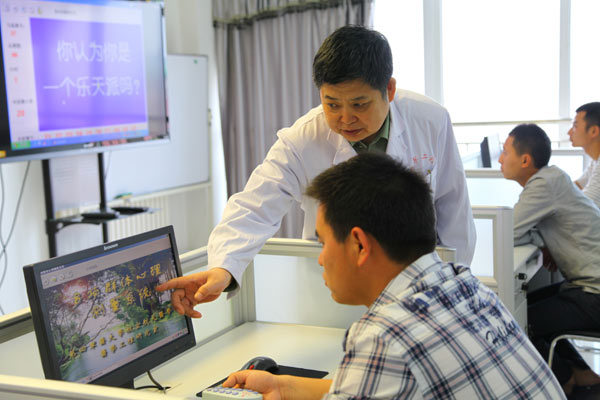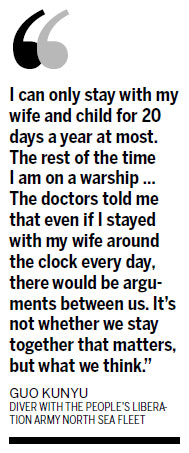Sanatorium helps soldiers deal with stress
Updated: 2012-06-05 07:38
By An Baijie in Qingdao, Shandong (China Daily)
|
|||||||||||
Once reserved for senior officers, it is open to lower-level army personnel
Navy diver Guo Kunyu looked at the 100 or so questions printed on the sheet of paper in front of him.
 |
|
Psychologist Dong Xiaoxin assists a soldier with his psychological assessment questionnaire at Qingdao Second Sanatorium of Jinan Military Region in Qingdao, East China's Shandong province, on Friday. Liu Zhaojun / for China Daily |
Do you often break glass to vent your anger?
Do you suspect other people are plotting against you?
Do you feel confused when you think about sex?
"The most unforgettable question was: 'Do you think about death?' After a short while, I wrote down 'sometimes' as my answer," said the 36-year-old.
The questionnaire is designed to evaluate the psychological health of People's Liberation Army personnel on special duty, such as divers, fighter pilots and submariners.
|
 |
Guo, who has served with the rescue team of the PLA North Sea Fleet for almost 20 years, was among 18 navy personnel who took the test on May 31 during a month-long stay at the Qingdao Second Sanatorium of Jinan Military Region in Qingdao, Shandong province.
The diver was later given a clean bill of mental health and cleared to return to duty.
"However, two of the people who took the examination showed signs that their moods are a little abnormal," psychologist Zhou Xifang said after reviewing the questionnaires.
"They will receive treatment to find out what problems they are struggling with and will then go through more tests," Zhou said.
"They will only return to their jobs if the results show their conditions are normal."
The coastal sanatorium - one of 23 such military facilities dotted around China, providing a range of leisure, rehabilitation and medical services - was once reserved for high-ranking officers. Now it is open to lower-level soldiers, sailors and airmen to help deal with stress among the ranks.
During their stay, which can last up to a month, guests receive physical checks, mental health tests, and medical and psychological treatment.
"PLA personnel are working at a more rapid pace, their lives are irregular and they must endure a lot of mental pressure," said Shan Shouqin, president of the sanatorium. "They need more help to keep them healthy."
Work pressure
Research by experts at Qingdao Second Sanatorium shows that the number of naval pilots with sub-standard health has steadily risen in recent years.
Zhou, the psychologist, said it is natural for soldiers, sailors and airmen to develop symptoms of mental strain, especially those who carry out special missions, such as sailors on naval escorts in the Gulf of Aden or rescuers after the Wenchuan earthquake in 2008.
"Lots of soldiers involved in the Wenchuan earthquake rescue mission were later found to have mental health problems after witnessing so many horrible scenes," added Zhou's colleague, Shi Haihong.
"Most of them recovered after being treated at our sanatorium for a month," Shi said.
Wei Jiangxiao, 23, a diver with the PLA East Sea Fleet, has been receiving treatment for the last month.
"I've learned to have an optimistic attitude during my time here," he said. "You smile at the world, and it will smile back at you."
He Wei said he suffered from anxiety after his first rescue mission, which involved recovering the body of a man who drowned in a lake.
"His body had swollen in the water. It was horrible," Wei recalled. "The pilot of our rescue boat could not stop from vomiting when he saw the body."
He said the scene was replayed constantly in his dreams, and his only release had been to drink beer with other soldiers.
"The doctors at the sanatorium told me that I didn't need to feel fear because I was helping the drowned man to get out of the water, and that the deceased would appreciate it," he added.
As well as helping PLA personnel at the Qingdao sanatorium, specialists are also regularly dispatched to naval and air force bases to provide physical and mental treatments.
One case described by Hou Fanggao, vice-president of the sanatorium, involved a helicopter pilot who had been grounded due to back pains.
"Although he was enthusiastic to start flying again, we had to call a permanent halt to him carrying out missions," Hou said. "We have to be responsible for both the patient's health and career."
Family issue
It is not always the nature of their work that causes problems for soldiers, airmen and sailors. Sometimes the pressure can come from home.
Guo, the diver, said he has a 2-year-old daughter and regularly receives complaints from his wife about not spending enough time with his family.
"She always asks me, 'What have you contributed to the family?' I always feel sad when I hear that," he said. "I can only stay with my wife and child for 20 days a year at most. The rest of the time I am on a warship.
"In foreign countries, there are priests who can calm servicemen down by talking to them, but in China there's no such role."
He said he often felt helpless when there are family emergencies, such as when his daughter is sick, but added that the doctors in Qingdao have helped him to handle the pressure better.
"The doctors told me that even if I stayed with my wife around the clock every day, there would be arguments between us," Guo said. "It's not whether we stay together that matters, but what we think."
Now, he said, he can see his wife's complaining in a positive light.
"It's just her way to vent her feelings," he added.
The names of the navy divers in this story have been changed due to PLA policy.
Shi Haihong contributed to this story.
Contact the writer at anbaijie@chinadaily.com.cn
Today's Top News
President Xi confident in recovery from quake
H7N9 update: 104 cases, 21 deaths
Telecom workers restore links
Coal mine blast kills 18 in Jilin
Intl scholarship puts China on the map
More bird flu patients discharged
Gold loses sheen, but still a safe bet
US 'turns blind eye to human rights'
Hot Topics
Lunar probe , China growth forecasts, Emission rules get tougher, China seen through 'colored lens', International board,
Editor's Picks

|

|

|

|

|

|





